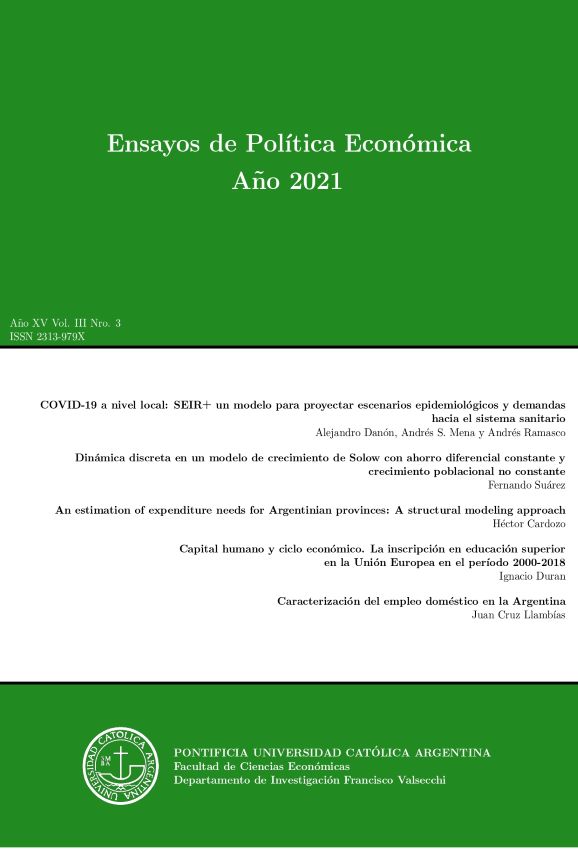Capital humano y ciclo económico: la inscripción en educación superior en la Unión Europea en el período 2000-2018
DOI:
https://doi.org/10.46553/ensayos.3.3.2021.p77-105Palabras clave:
desempleo, ciclos económicos, educación superior, capital humanoResumen
El presente trabajo analiza el comportamiento cíclico de la inscripción en educación
superior de adultos jóvenes. Para esto se desarrolla un modelo de datos de panel para
los países de la Unión Europea entre el año 2000 y el 2018. En primer lugar, se
encuentran efectos estadísticamente significativos del ciclo económico en la inscripción,
los cuales difieren según características sociodemográficas como edad y sexo. En
concreto, para la inscripción de jóvenes de entre 20 y 30 años se observa tanto efectos
pro-cíclicos del PBI per cápita como contra-cíclicos de la tasa de desempleo, aunque no
para otros rangos etarios. Al analizar por separado la inscripción a diferentes programas,
se encuentra que, en programas de ciclo corto, grado y maestría la inscripción femenina
se ve más afectada que la masculina por variaciones en el PBI per cápita. Se observan
además diferencias en el comportamiento de la inscripción según el nivel de PBI per
cápita y profundidad financiera del país.
Descargas
Citas
Barakat, B., Holler, J., Prettner, K., & Schuster, J. (2010). The impact of the economic crisis on labour and education in Europe. Vienna Institute of Demography Working Papers No. 1006. Disponible en: https://EconPapers.repec.org/RePEc:vid:wpaper:1006
Becker, G. S. (1964). Human capital: A theoretical and empirical analysis, with special reference to education. University of Chicago Press.
Bedard, K., & Herman, D. A. (2008). Who goes to graduate/professional school? The importance of economic fluctuations, undergraduate field, and ability. Economics of Education Review, 27(2), 197-210.
Bell, D., & Blanchflower, D. G. (2010). Young people and recession: A lost generation? Paper presented at the fifty-second panel meeting of Economic Policy, October 22-23, 2010.
Betts, J. R., & McFarland, L. L. (1995). Safe port in a storm: The impact of labor market conditions on community college enrollments. Journal of Human Resources, 30(4), 741-765. https://doi.org/10.2307/146230
Bogan, V.L., & Wu, D. (2018). Business cycles, race, and investment in graduate education. Journal of Economics, Race and Policy, 1, 142–175
https://doi.org/10.1007/s41996-018-0004-x
Cochrane, J. H. (1994). Permanent and transitory components of GNP and stock prices. The Quarterly Journal of Economics, 109(1), 241-265.
Dellas, H., & Sakellaris, P. (2003). On the cyclicality of schooling: theory and evidence. Oxford Economic Papers, 55(1), 148-172. https://doi.org/10.1093/oep/55.1.148
Drozdowicz-Bieć, M. (2011). Reasons why Poland avoided the 2007-2009 recession. Prace I Materiały, 86(2), 39-66. Disponible en: https://EconPapers.repec.org/RePEc:wsd:irgpim:v:86:y:2011:i:2:p:39-
Flug, K., Spilimbergo, A., & Wachtenheim, E. (1998). Investment in education: do economic volatility and credit constraints matter? Journal of Development Economics, 55(2), 465-481. https://doi.org/10.1016/S0304-3878(98)00045-5
Foote, A., & Grosz, M. (2020). The effect of local labor market downturns on postsecondary enrollment and program choice. Education Finance and Policy, 15(4), 593–622. https://doi.org/10.1162/edfp_a_00288
Ghita, S., Titan, E., & Boboc, C. (2013). How does the economic-financial crisis affect our education? Study on EU-28 Countries. Ovidius University Annals, Series Economic Sciences, 13(2), 112-117.
Disponible en: https://EconPapers.repec.org/RePEc:ovi:oviste:v:xiii:y:2013:i:2:p:112-
Goh, W. (2009). Is enrollment into graduate school affected by the business cycle? Stanford University, Department of Economics.
Kärkkäinen, K. (2010). Summary of the June 2009 educationtoday Crisis Survey. OECD Education Working Papers No 43. https://doi.org/10.1787/5kmmsxbws77d-en
OCDE (2012). How has the global economic crisis affected people with different levels of education? Education Indicators in Focus.
Disponible en: http://www.oecd.org/dataoecd/35/44/49471658.pdf
Sakellaris, P., & Spilimbergo, A. (2000). Business cycles and investment in human capital: international evidence on higher education. Carnegie-Rochester Conference Series on Public Policy, 52, 221-256. https://doi.org/10.1016/S0167-2231(00)00024-5
Schafmeister, F. (2016). The Cyclicality of Enrollment in Tertiary Education [Tesis de maestría, Erasmus Universiteit Rotterdam].
Disponible en: https://thesis.eur.nl/pub/35059/Schafmeister.pdf
Skrbinjek, V., Lesjak, D., & Šušteršič, J. (2015). Impact of economic crisis on student demand for tertiary education. In Managing intellectual capital and innovation for sustainable and inclusive society: Proceedings of the MakeLearn and TIIM Joint International Conference (pp. 2267–2274). 27–29 May 2015, Bari: ToKnowPress.
Disponible en: https://EconPapers.repec.org/RePEc:tkp:mklp15:2267-2274
Van Damme, D., & Kärkkäinen, K. (2011). OECD Educationtoday Crisis Survey 2010. OECD Education Working Papers No 56. https://doi.org/10.1787/5kgj1r9zk09x-en
Varghese, N. V. (2010). Running to stand still: Higher education in a period of global economic crisis. Research Papers IIEP.
Descargas
Publicado
Cómo citar
Número
Sección
Licencia








